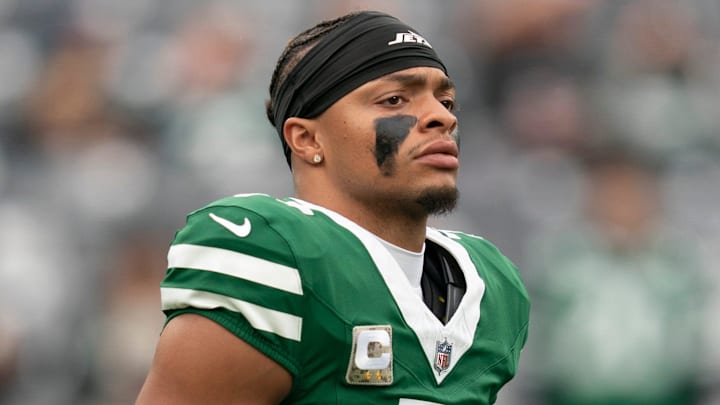The New York Jets were ridiculed by many around the NFL a little under a week ago for hitting the reset button, trading away Sauce Gardner and Quinnen Williams, two of the franchise’s cornerstones, for piles of draft picks and cap flexibility. On paper, it looked like a white flag to some.
But if Sunday's Week 10 win over the Cleveland Browns proved anything, it’s that the vision behind those controversial trades might already be paying off.
The Jets went into Cleveland without their All-Pro corner or star defensive tackle and somehow walked out with a 27–20 win. They did it despite Justin Fields completing just six passes and the offense barely topping 50 yards through the air. It wasn’t pretty, but it was notable.
This wasn’t a team falling apart after a fire sale. Jets fans were witness to a team that played with discipline, energy, and belief in a bigger plan. The players are bought in, and more importantly, the Jets have all the draft capital they need to ensure they fix the one problem still plaguing this franchise.
The quarterback position.
Jets' Week 10 win over the Browns helped justify the Sauce Gardner trade
Under general manager Darren Mougey and head coach Aaron Glenn, that plan is now crystal clear. The Jets have five first-round picks over the next two years and two second-rounders this spring, an embarrassment of draft capital they can use to finally land a quarterback, whether through the draft or a trade.
That’s the point of all this. The Jets know they don’t have their long-term answer under center. Sunday’s win, in its own weird way, reinforced it. Fields was borderline unplayable for roughly the third or fourth time this season.
The former Chicago Bears quarterback is putting together what is likely the worst season of his NFL career, was nearly benched in favor of veteran Tyrod Taylor just a few weeks ago, and is trending toward a permanent benching at some point in the near future.
The Jets have building blocks on their offensive line. They have a superstar wide receiver in Garrett Wilson and a pair of impressive young playmakers in Breece Hall (if he's retained) and Mason Taylor. They need the quarterback.
The offense was non-functional with Fields under center on Sunday, yet the defense and special teams carried them again. That's exactly the kind of effort that reinforces the notion that players are bought in on the Glenn era.
The Jets aren’t chasing short-term optics anymore. They’re trying to build a roster whose best players peak together. Gardner and Williams are fantastic players, but they were also expensive, and their primes no longer aligned with the rest of this roster’s timeline.
The Jets decided it was better to turn those contracts into flexibility — into the draft capital they need to build around a future quarterback. They now have the ammo to either draft their next franchise QB or surround him with real talent once they find him.
In reality, we won’t know if the Jets made the right decision trading Gardner or Williams for a few years, not until those draft picks are utilized and we see how their careers unfold with their new teams.
But one thing is already clear. Despite back-to-back wins, the Jets do not have their long-term quarterback on the roster. That, more than anything, is why these moves were made. The trades were about timing, about aligning contracts and development curves around the most important position in football.
In a game where the Jets clearly didn’t have a quarterback, they proved they have something else — direction. And that’s something the franchise hasn’t had in a long time.
